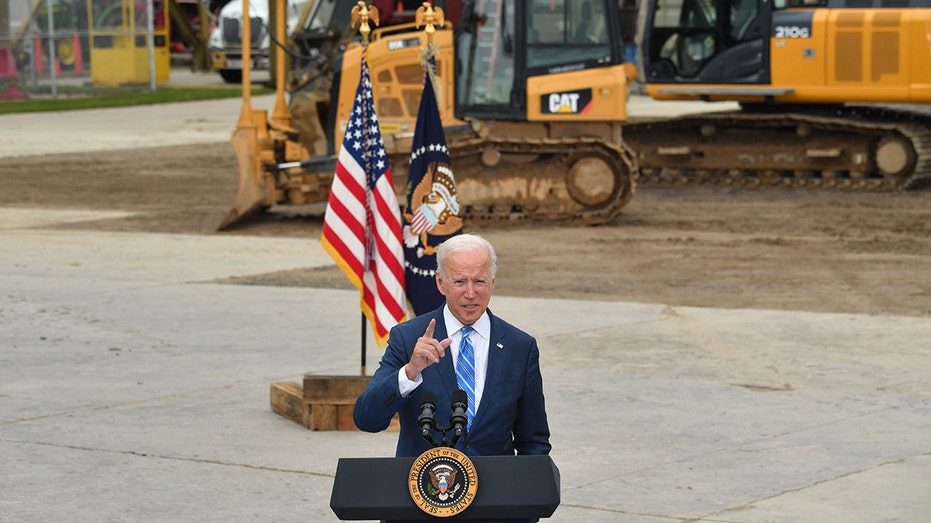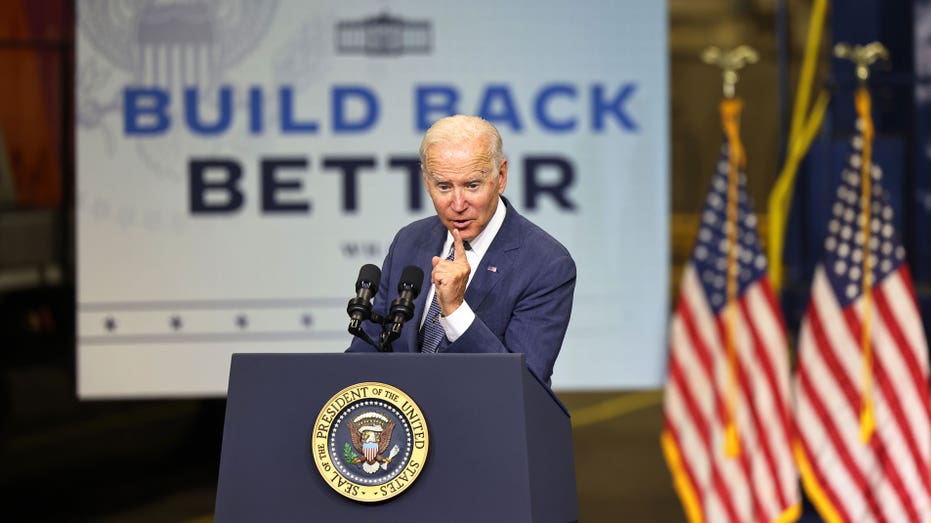Democrats' spending plan could cause US debt to surge, despite Biden claim: analysis
‘Inflation is political death’: Wesbury
Economist Brian Wesbury, Gary Kaltbaum, and Jim Bianco discuss rising inflation amid a hot market on ‘Making Money’
President Biden has repeatedly pledged that his signature spending plan will pay for itself and add zero dollars to the federal deficit thanks to a slew of tax hikes on wealthy Americans and corporations, but a new analysis suggests the $1.75 trillion measure could trigger a significant debt increase by 2050.
The newest "Build Back Better" proposal – pared down from the original $3.5 trillion request – would expand Medicaid, establish universal preschool, provide new funding for child care and offer green energy tax credits, though it notably omits progressive priorities like free community college and Medicare coverage of dental and vision. It relies on $1.95 trillion in new taxes, including a 15% corporate minimum and a surcharge aimed at ultra-millionaires.
"We pay for everything we spend," Biden said recently while speaking at the White House. "It’s going to be zero. Zero."
BIDEN PITCHES REVAMPED MILLIONAIRES TAX, GLOBAL MINIMUM TO FUND SPENDING BILL
But findings from the Penn Wharton Budget Model, a nonpartisan group at the University of Pennsylvania's Wharton School, suggest Biden's plan could actually spend about $1.87 trillion over the next 10 years, while increasing revenues by just $1.56 trillion over the same period. That would cause the nation's already record-high debt to increase by 2% in 2050 (relative to the current baseline, that's close to $580 billion).
If passed, the plan would shrink GDP, the broadest measure of goods and services produced in the country, by about 0.4% by 2050.
Although the White House initially proposed steep increases in corporate taxes, capital gains taxes and income taxes, the bulk of those plans appear to have fallen to the wayside after pushback from Sen. Kyrsten Sinema, D-Ariz. The majority of former President Donald Trump's signature 2017 tax law, which substantially lowered rates for corporations and well-off Americans, will likely remain intact in the newest Build Back Better plan. The framework that Biden rolled out relies on a 15% corporate minimum tax, surtaxes on the top sliver of U.S. households, stricter tax enforcement, taxes on corporate stock buybacks and higher taxes on U.S. companies' foreign earnings. The White House estimated that it would raise about $1.995 trillion in new revenue – $500 billion more than Penn Wharton analysts found. Some of the biggest revenue discrepancies in Biden's plan stem from the proposed 15% minimum on corporations based on profits they report to shareholders, a tax that would only apply to companies that reported over $1 billion in income for three straight years. Although the White House estimated the minimum could increase tax revenue by $325 billion, Penn Wharton found it would be closer to $195 billion. Another major difference stems from the 1% surcharge on stock buybacks to deter companies from repurchasing their own stock from investors. The Biden administration predicted the stock buyback surcharge could generate about $125 billion in revenue, while Penn Wharton estimated it would only create about $50 billion. Finally, the White House plan to beef up IRS enforcement by giving the agency more funding to hire more enforcement agents, modernize outdated technology and invest in taxpayer services would only raise about $190 billion – less than half of the $400 billion predicted by the Biden team, according to Penn Wharton. What's more, although the bulk of the programs and spending initiatives in the bill are poised to sunset in just a few years, lawmakers often pass multiyear extensions down the road, meaning the Congressional Budget Office assumes those measures will expire when it scores the legislation. Democrats have made it clear that by taking an across-the-board cuts approach to the spending package, they intend to force a future Congress to extend popular programs in a few years (whether or not they will be able to do so ultimately depends on the 2022 midterms and 2024 presidential election). GET FOX BUSINESS ON THE GO BY CLICKING HERE For instance, in the plan rolled out last Thursday, Biden proposed a temporary, one-year extension of the expanded child tax credit, which provides up to $3,600 per child to families. The White House estimated the temporary expansion would cost about $100 billion annually. But Democrats and the president have both pushed for a permanently expanded child tax credit, which would actually cost about $1.6 trillion. It's not uncommon for lawmakers to use what critics slams as "budget gimmicks" to make the price tag appear smaller than it actually may be: For instance, in 2017, Republicans passed the Tax Cuts and Jobs Act that included several income tax provisions slated to sunset within a few years – but lawmakers indicated at the time they had no intention of letting that happen. If Democrats move to make the provisions in the spending package permanent, it would cost a whopping $4.26 trillion over the next decade – and would push the federal deficit 25.2% higher and GDP 2.8% lower in 2050. Source: Read Full Article



